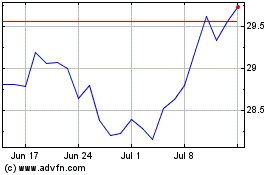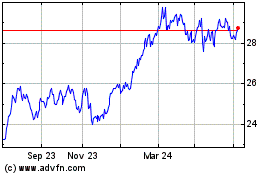Brexit Trigger News Sends British Pound Lower
October 03 2016 - 12:00AM
Dow Jones News
HONG KONG—The British pound fell in Asia Monday after Prime
Minister Theresa May said the U.K. would kick off the process of
separating from the European Union by the end of March.
In Asian trading, the pound fell 0.3% to $1.2935. The daily drop
wasn't spectacular—the pound posted five larger daily declines last
month—but it followed another rough quarter for the currency. The
pound lost 2.5% against the U.S. dollar in the third quarter,
recording its fifth consecutive quarterly loss. The British
currency fell 1.2% against the dollar in September, marking its
largest monthly percentage decline since June.
A slowdown in trade could spur the Bank of England to further
cut interest rates. In August, the central bank cut its benchmark
interest rate to a record low and reduced its 2017 growth outlook.
Expectations for lower interest rates tend to drag on values of
currencies.
Voters in the U.K. elected to leave the EU in June. Mrs. May
must formally notify the EU of Britain's plan to leave under
Article 50, which triggers a two-year period of negotiations over
the terms of the split.
Up for debate is whether British companies will be able to
access Europe's free-trade zone. That access is contingent on
countries agreeing to let European Union citizens live and work
anywhere in the bloc. Mrs. May suggested she wants British
companies to operate in the single European market, but not if that
meant giving up the right to restrict immigration to the U.K.
The EU is the U.K.'s biggest trading partner.
"If U.K. exporters will lose access to [the free-trade zone],
the question is how quickly can they negotiate bilateral
agreements," said Khoon Goh, head of Asia research at Australia
& New Zealand Banking Group in Singapore. "That could be quite
difficult," he added.
Australia is holding preliminary trade talks with the U.K.,
though a deal can't be signed until Britain formally exits.
Sentiment appears to be souring among fast-money investors.
Leveraged funds, a group that includes some hedge funds, added to
their bets that the pound would decline in the week ended Sept. 27,
according to the latest data from the U.S. Commodity Futures
Trading Commission. Those bets, based on futures and options,
nearly doubled to $5 billion from $2.7 billion in the week before,
Mr. Goh said.
Jenny Gross and Nicholas Winning contributed to this
article.
Write to Saumya Vaishampayan at saumya.vaishampayan@wsj.com
(END) Dow Jones Newswires
October 02, 2016 23:45 ET (03:45 GMT)
Copyright (c) 2016 Dow Jones & Company, Inc.
Australia And New Zealan... (ASX:ANZ)
Historical Stock Chart
From Mar 2024 to Apr 2024

Australia And New Zealan... (ASX:ANZ)
Historical Stock Chart
From Apr 2023 to Apr 2024
